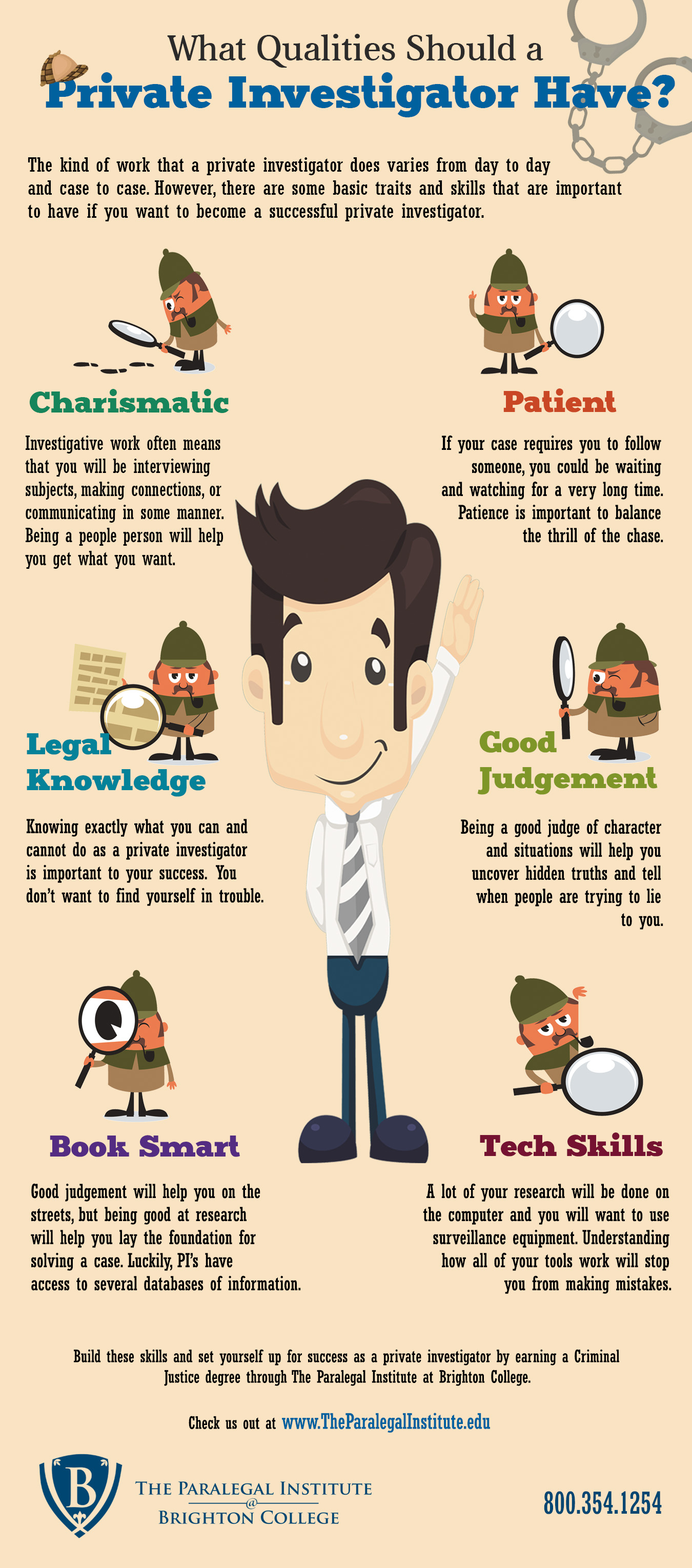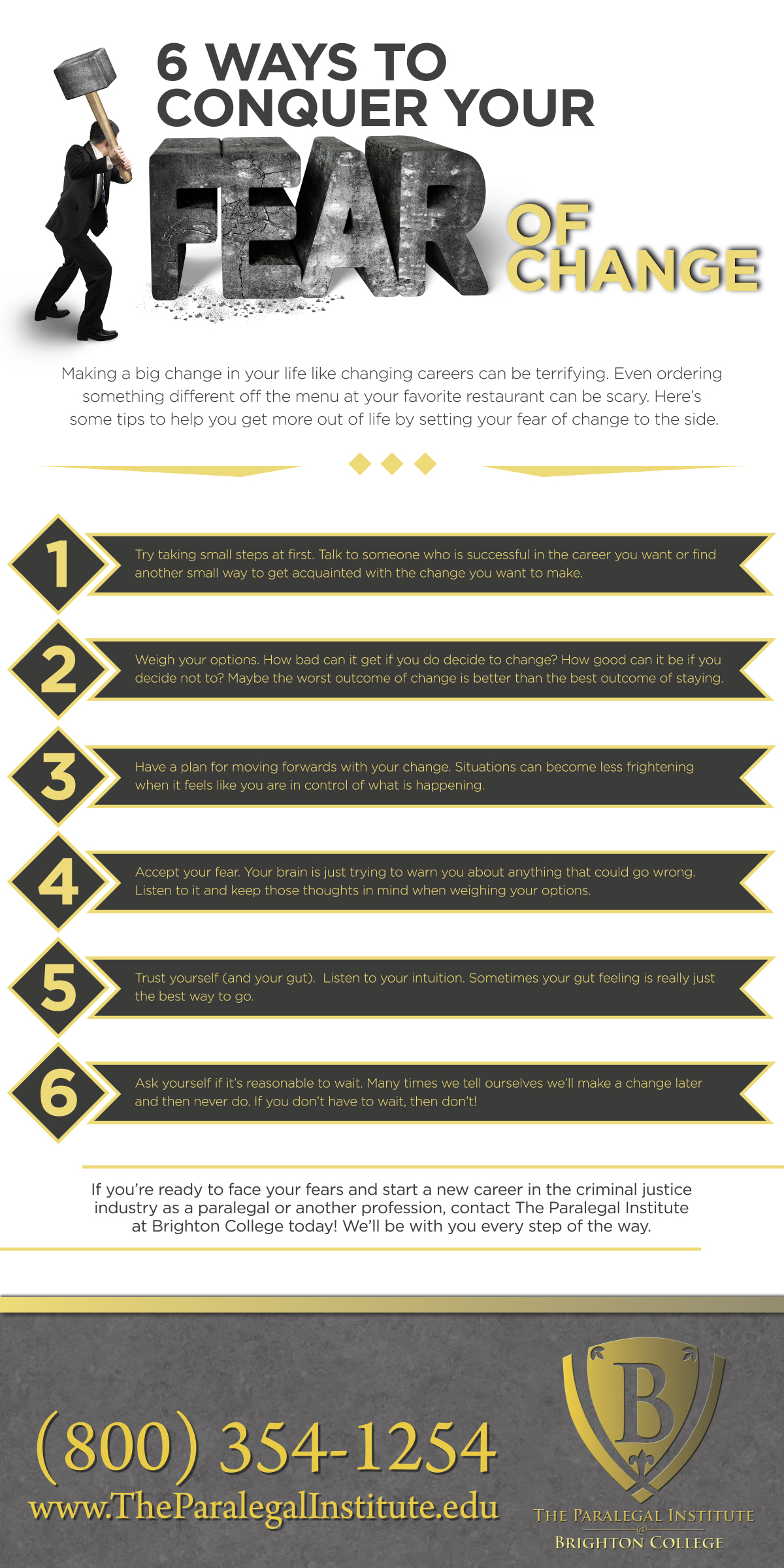

Author: Sam Fernandez
6 Ways to Conquer Your Fear of Change
Click the image to enlarge.
6 Ways to Conquer Your Fear of Change
Making a big change in your life like changing careers can be terrifying. Even ordering something different off the menu at your favorite restaurant can be scary. Here’s some tips to help you get more out of life by setting your fear of change to the side.
- Try taking small steps at first. Talk to someone who is successful in the career you want or find another small way to get acquainted with the change you want to make.
- Weigh your options. How bad can it get if you do decide to change? How good can it be if you decide not to? Maybe the worst outcome of change is better than the best outcome of staying.
- Have a plan for moving forward with your change. Situations can become less frightening when it feels like you are in control of what is happening.
- Accept your fear. Your brain is just trying to warn you about anything that could go wrong. Listen to it and keep those thoughts in mind when weighing your options.
- Trust yourself (and your gut). Listen to your intuition. Sometimes your gut feeling is really just the best way to go.
- Ask yourself if it’s reasonable to wait. Many times we tell ourselves we’ll make a change later and then never do. If you don’t have to wait, then don’t!
If you’re ready to face your fears and start a new career in the criminal justice industry as a paralegal or another profession, contact The Paralegal Institute @ Brighton College today! We’ll be with you every step of the way. Call today at 1-800-354-1254!
Online Education Makes It Easier To Reach Your Goals

It wasn’t very long ago that getting a college degree or professional certification automatically meant attending classes on a campus. Now, however, the expense of living requires many people to work while trying to fit classes in at night. Online learning has changed all of that, and an increasing number of people now turn to distance learning to further their education when they are already working full- or part-time, taking care of a family, or both.
Online education has grown so much in the past decade that this viable method of education—without the classroom component—makes it much easier for the time-challenged individual to decide on a course and stick to it. In fact, distance learning has been made so accessible and flexible that for many students already juggling several life responsibilities, it is the preferred way to learn and earn a degree.
Online institutions continue to evolve and to offer programs leading to a wide range of career choices, making the education you want affordable, effective, and convenient in today’s busy world.
Time Management
If you have a life that is crazy-busy, you are the only one who can determine when, where, and how much time you devote to your courses and reaching your goal. Good time management is essential to this process, and the benefits are clear:
- You decide what your goal is, which courses to take, and how many of them.
- Compared to taking on-campus courses, which require attendance at specific days and hours, you can take your classes any time you want—and you can do it wearing your pajamas!
- You decide on a specific time each day to do your coursework. This means you can fit in that study time while the baby is napping or after the plumber has left.
- Even people whose work demands them to travel can configure their time to include studying.
This ability to schedule your classwork around your other responsibilities is a tremendous time management tool, only available with online education.
Accessibility
Online education allows you to skip, repeat, and review at your own pace. Not only are the courses literally at your fingertips, but you can watch and rewatch as much and as often as you need to. So, if there was something in a lecture that you did not understand or that you missed, you can review the material at your convenience.
- Communication with your teachers is easier. There will be no more office hours that limit your ability to reach a teacher with a question or issue: email replaces waiting outside the professor’s door until he or she is there.
- Geography is no problem. Online learning gives the student the opportunity to go into their specific area of interest with the click of a cursor. The geographical location of the course is no longer a potential barrier since you can find the course you want even if your local colleges don’t teach it.
- And online learning also offers certificates in many professional areas that may not be taught in your local two- or four-year colleges.
Even the physical demands of online learning are easier since you no longer have to haul heavy class books around with you or wait until the book you want from the library is returned. And whether you use a laptop or a desktop computer, you will have access to much of the course material any time you need it.
Efficiency
Many people find that online learning is a far more efficient use of time than going to classes:
- There is no distracting chatter or time-wasting questions when you are learning online.
- If you have the time and the drive, it’s possible to take accelerated courses at many online colleges, so you can complete a course in less time than it would take at a brick-and-mortar campus.
- An unexpected benefit of online education is that taking online courses will almost certainly improve your computer skills, and this is something that can only help you as you go forward in today’s competitive job market.
- We can’t talk about efficiency without mentioning money. Universities and colleges offering online degrees are typically cheaper to attend because of the lower costs the institution incurs without a huge overhead, property, and staff.
Online education is the way of the future. At The Paralegal Institute @ Brighton College, you will find diverse programs that let you reach your educational and career goals in an efficient and affordable way.
How You Can Help Others as a Paralegal

If you’ve been thinking about becoming a certified paralegal, you have probably already done enough research into the field to know that the position of a paralegal is an important one, both to the individual lawyers in the office and to the makeup of the entire team of professionals working together on legal cases. You may also already know that attention to detail, excellent retention, and sharp interviewing skills are part of the whole professional paralegal package.
The best paralegals help keep the case on track in the office and also keep the client informed about the progress of the case and aware of the specific steps being taken as the case is being built. Because clients can have so much direct contact with the paralegal, that paralegal has to be clear and informational, especially at the frequent times when an attorney is simply too busy to talk. The paralegal will be the point person in the office who sees to it that the client is both up-to-date and comfortable that they are getting all the information they need to understand exactly how the case is progressing.
It is important that the client understand all the various different ways in which a paralegal can provide them with help and support. Clients who know and trust their attorney’s paralegal staff will undoubtedly be very happy to learn that the paralegal is able to provide legal services that are more affordable than when the same services are performed by an attorney.
“Attorneys enhance the legal profession’s ability to provide legal services to clients at an affordable rate. By delegating work which would have been done by the attorney (whose cost to the client would have been billed at a higher rate), lawyers have made paralegals a vital part of the legal profession) – Ohio Bar
A lot of what makes the paralegal an important part of the team and its success is the ability of the paralegal to communicate effectively with clients. Paralegals can not only take and give information and keep the client informed about developments and progress, but can keep the lines of communication open while providing a trusted conduit between attorney and client. So, while knowledge, hard work, and good organizational skills are must-haves for successful paralegals, communication skills are equally important. The bottom line here is that the paralegal plays a pivotal role in keeping on top of the exchange of information and facts between lawyers and clients.
There is another important area of this career that may not have been stressed as strongly as the need for these specific skills: the relationship between the paralegal and the client. Since the paralegal is often directly in contact with the client more than the attorney is, this can be a critically important part of the job and the skills required for it, such as understanding and empathy.
As an outstanding paralegal you will not just be familiar with the law, but interested in being supportive and sympathetic to clients who are often distressed at the legal situation in which they find themselves. As Lynne J. DeVenny, a certified paralegal with over 25 years of experience writes in her blog, clients have. . . “come to us during some of the worst periods of their lives, trusting us to help them and give them guidance until they can get to better days.”
This frank and accurate assessment of the position many clients find themselves in is important to remember: it is generally only a problem that they can’t solve themselves that will bring a client to a lawyer, and by any assessment, this kind of problem is going to be creating stress and anxiety in the client. A paralegal’s sensitivity and response to this stress can make the difference to a client who wants to be reassured that everything possible is being done for them.
The American Bar Association recommends that when hiring a paralegal, attorneys look for “. . . excellent organizational skills, someone who is. . . detail minded and able to multi-task, and who has a genuine interest in the law and empathy with clients’ problems. . .” .
With that in mind, you can decide if you have the characteristics—intelligence, drive, clarity and empathy—that create the best paralegals. And if you do, you can get the education and certifications you need for a career in this important and growing legal field at the Paralegal Institute @ Brighton College online, which offers two different accredited paralegal programs, a Paralegal Associate Degree and a Paralegal Studies Diploma. Contact us today!
What Attorneys Look for in Paralegals
Paralegals play an integral role in the smooth operation of a law office. For many, including Phoenix Criminal Defense Attorneys at Tyler Allen Law Firm, the delivery of legal services to clients depends upon the work of a strong and effective legal team made up of attorneys and paralegals working together.
At Tyler Allen Law Firm, we believe building that team begins by hiring the best paralegals. The problem faced by employers is choosing the best person for the job. When there are many applicants you want to find the one person who will turn out to be a truly great paralegal.
Here are some of the things our attorneys look for, or want, in a paralegal:
Excellent communication skills
The ability to communicate with others is probably one of the most valuable skills a paralegal can possess. A person could be an effective researcher or have the ability to grasp complex legal principles, but the best paralegals know how to convey that information using excellent written and verbal communication skills.
Able to work independently
Legal and ethical guidelines require that paralegals work under the supervision and guidance of an attorney. The way this works in most busy law practices is for an attorney to assign a task to a paralegal who is expected to work independently and take whatever steps are necessary to complete the assignment with oversight from the attorney.
For example, a paralegal might be asked to research the legal significance of a document which is part of the basis of the lawsuit against the client.
The paralegal is expected to work independently to:
- Research the law
- Investigate the facts surrounding the document
- Identify any defenses that might be available to the client
- Prepare a memorandum of law for the attorney
Flexible and capable of adapting to different work styles
It is common for paralegals in a law office to work for different attorneys from time to time. A good paralegal can easily adapt to variations in the way each attorney works. Some attorneys work at a different pace than do other attorneys. Personalities, practice areas and work styles often differ from one attorney to another.
An attorney representing clients facing criminal charges might need research or motions completed quickly and on short notice due to court imposed deadlines.
An attorney engaged in estate planning in the same law office might be less demanding as far deadlines go. A paralegal must adapt to the style and requirements of the different attorneys within an office.
Precision and attention to detail
Accuracy and precision are important in a law office. Filing papers with a court a day late can have devastating results for a client. Missing a statute of limitations deadline for starting a lawsuit on behalf of a client injured in an accident could lead to the dismissal of the claim. This, in turn, could result in a malpractice claim against the attorney for whom the paralegal works.
Successful paralegals:
- Double check their facts and pay careful attention to details.
- Check the filing deadline when asked to prepare papers for a case even though it was not part of the assignment.
- Proofread for spelling and grammatical errors and make sure headings are correct.
Honesty and integrity
A paralegal owes equal responsibility to the client. Clients put their faith and trust in attorneys and the paralegals who work with them. Paralegals are held to the same standards of confidentiality and integrity as the attorney.
Multitasking and working under stress
Rarely does a paralegal have the opportunity to work on a single task at any given time. A typical day for a busy paralegal usually involves performing multiple tasks, such as:
• Talking to clients, witnesses and attorneys on the telephone or in the office
• Conducting legal research in the office or in a law library
• Going to court to file papers
• Preparing motions, documents and pleadings
• Scheduling court appearances
• Helping the attorneys prepare for hearings
The number of things that must be done may feel overwhelming at times, but a great paralegal can manage and organize time. Time-management skills can be learned, but a person must be willing to do so.
Capable of working as part of a team
The ability to work independently is an important skill for a paralegal, but it is just as important to be able to function as part of a team. The attorney typically leads the legal team, but it may also include secretaries, investigators and others in addition to one or more paralegals. Achieving the most favorable legal result for the client requires all members of the team working together.
A pleasant and client-focused personality
Clients want to feel confident that their legal matter is being handled properly. A paralegal should be professional, compassionate and understanding of the needs of each client the office represents.
If you are considering a career as a Paralegal, The Paralegal Institute at Brighton College can help. Contact us at 800-354-1254. We offer a Paralegal Studies Diploma and Paralegal Associate Degree. Fill out the form today and get more information on this exciting career.
About Tyler Allen:
Tyler graduated from Arizona State University Law School and was admitted to the Arizona Bar in 2009. He represents clients in Employment Law, Estate Planning, Criminal Defense, and DUI & Traffic Defense matters at Tyler Allen Law Firm in Phoenix, AZ.
Admitted: Arizona, U.S. Dt. Ct. of Arizona
Law School: Arizona State University College of Law, J.D.
Undergraduate: University of Utah, B.S. Political Science, cum laude
7 Resume Mistakes That Keep You From Getting Hired

7 Resume Mistakes That Keep You From Getting Hired
The people working in HR are going to skim over your resume quickly before deciding to read it- or to hire you. Here are some glaring mistakes you need to avoid if you want the job.
- Typos: If you leave typos in your resume, you may as well send a note that says “I don’t value my work enough to take the time to proof-read.”
- Spelling and Grammatical Errors: These mistakes are similar to typos, but may lead readers to think you are not educated well enough for the job.
- Disorganization: If your resume isn’t formatted well or is generally messy, it will be difficult for anyone skimming it to get a good idea of who you are.
- Lying: More likely than not, you will get caught in whatever embellishment you add to your resume and lose your chances at getting the job.
- Lack of Confidence: Getting wildly creative with formatting, lying, and not putting your best foot forward are all signs of a weak job candidate. You can do it!
- Hiding Important Facts In Blocks of Text: Make sure your resume, especially the important bits, are chunked into lists or other easy-to-manage sections, or no one will look twice.
- You Tell Instead of Show: Your resume shouldn’t read like a grocery list. Be proud of your work and offer examples of how you helped your past employers succeed.
If you find that your resume is lacking passion, perhaps the answer is that you aren’t in the right field. The Paralegal Institute at Brighton College offers online programs in the criminal justice field. Pursue your passion today. Call us at 800-354-1254
Embed This Image On Your Site (copy code below):
Online Education Makes It Easier To Reach Your Goals
It wasn’t very long ago that getting a college degree or professional certification automatically meant attending classes on a campus. Now, however, the expense of living requires many people to work while trying to fit classes in at night. Online learning has changed all of that, and an increasing number of people now turn to distance learning to further their education when they are already working full or part-time, taking care of a family or both.
Online education has grown so much in the past decade that this viable method of education – without the classroom component – makes it much easier for the time-challenged individual to decide on a course and stick to it. In fact, distance learning has been made so accessible and flexible that for many students already juggling several life responsibilities, it is the preferred way to learn and earn a degree.
Online institutions continue to evolve and to offer programs leading to a wide range of career choices, making the education you want affordable, effective and convenient in today’s busy world.

Time Management
If you have a life that is crazy-busy you are the only one who can determine when you study, where you study, and how much time you devote to your courses and reaching your goal. Good time management is essential to this process, and the benefits are clear:
- You decide what your goal is, which courses to take and how many of them.
- Compared to taking on-campus courses which require attendance at specific days and hours, you can take your classes any time you want – and you can do it wearing your pajamas!
- You decide on a specific time each day to do your coursework. This means you can fit in that study time while the baby is napping or after the plumber has left.
- Even people whose work demands them to travel can configure their time to include studying.
This ability to schedule your classwork around your other responsibilities is a tremendous time management tool, only available with online education.
Accessibility
Online education allows you to skip, repeat and review at your own pace. Not only are the courses literally at your finger-tips, but you can watch and re-watch as much and as often as you need to. So if there was something in a lecture that you did not understand or that you missed, you can review the material at your convenience.
- Communication with your teachers is easier. There will be no more office hours that limit your ability to reach a teacher with a question or issue: email replaces waiting outside the professor’s door until he or she is there.
- Geography is no problem. Online learning gives the student the opportunity to go into their specific area of interest with the click of a cursor. The geographical location of the course is no longer a potential barrier, since you can find the course you want even if your local colleges don’t teach it.
- Online learning also offers certificates in many professional areas which may not be taught in your local two- or four-year colleges.
Even the physical demands of online learning are easier, since you no longer have to haul heavy class books around with you or wait until the book you want from the library is returned. And whether you use a laptop or a desk top computer, you will have access to much of the course material any time you need it.
Efficiency
Many people find that online learning is a far more efficient use of time than going to classes.
- There is no distracting chatter or time-wasting questions when you are learning online.
- If you have the time and the drive, it’s possible to take accelerated courses at many online colleges, so you can complete a course in less time than it would take at a bricks and mortar campus.
- An unexpected benefit of online education is that taking online courses will almost certainly improve your computer skills, and this is something that can only help you as you go forward in today’s competitive job market.
We can’t talk about efficiency without mentioning money. According to Best Value Schools, universities and colleges offering online degrees are typically cheaper to attend because of the lower costs the institution incurs without a huge overhead, property and staff.
In Sum
Online education is the way of the future. At online institutions such as Brighton College you will find diverse programs that let you reach your educational and career goals in an efficient and affordable way. Check out The Paralegal Institute online career training programs now. Fill out our contact form or call us today at 1-800-354-1254 to learn more!
What Qualities Should a Private Investigator Have?

The kind of work that a private investigator does varies from day to day and case to case. However, there are some basic traits and skills that are important to have if you want to become a successful private investigator.
Build these skills and set yourself up for success as a private investigator by earning a Criminal Justice degree through The Paralegal Institute at Brighton College. Get in touch with us at 800.354.1254.
Embed This Image On Your Site (copy code below):
Legal Nurse Consultants: A Growing, Challenging and Rewarding Career
Are you considering taking a big career step forward by becoming a Legal Nurse Consultant?
This relatively new field (in existence since the mid-1980’s) is growing quickly and becoming increasingly important in the preparation of many different kinds of legal cases. These include Workers Compensation, Fraud, Medical Malpractice cases and many, many others. LNC’s fill a niche that no one else can fill, bringing to their jobs the knowledge and experience of nursing and a course-driven familiarity with the legal process. Do you think you can be that person that bridges the gap between the medical and legal worlds? Here’s an overview of the profession and its requirements that may help you decide.
Pivotal Team Member
A Legal Nurse Consultant brings a wealth of knowledge to the table. As an important part of a legal team, the LNC provides the medical expertise for a lawyer or legal team, whether it’s in a law office, an insurance company, a government agency or a hospital. You will be the team member responsible for medical research and for educating your fellow team members on medical jargon and definitions and sometimes for testifying as an expert witness in a case. This is a highly demanding position, since you are a pivotal player in a legal case involving medicine, and as such, must be able to identify where the two fields impact each other in regards to the current case.
Qualifications
There are strict standards for this profession. If you are already an RN, you will also need a current license to practice, five years of practice as a nurse behind you and at least 2000 hours in legal consulting work completed before you are eligible to take the American Legal Nurse Consultant Certification Board (LNCC) exam. If you aren’t an RN already, you will have to earn the degree with a B.A. or associates degree in nursing and passing your state’s licensing exam before starting your LNC coursework and training.
Duties
As an LNC, some of your responsibilities will involve researching both medical literature and medical records; preparing expert reports on illnesses or injuries that are part of the current case; understanding and explaining standards of care; interviewing clients and medical personnel and testifying as an expert witness. (Giving expert testimony is not a requirement of the job, but if you can do it comfortably and knowledgeably, both you and the case stand to benefit!).
Lifestyle
If you are at a point in your life that is relatively settled and routine then you will definitely have an advantage when you begin taking the coursework required to become an LNC. Unless – unlike most of us – you have enough money to support yourself without having to work while you are becoming qualified, you will have a lot to juggle in your life. So when you take on the challenge of becoming an LNC, it’s optimal to have your daily routine already in place with specifically designated times for work, for family, for coursework and for studying. In other words, it is helpful to be a highly motivated and well-organized person for this rewarding, but not easy choice.
Who You Are
Legal Nurse Consultants need to have the same basic and outstanding personality traits that good nurses have: compassion, excellent communications skills, detail-oriented organizational skills, an agile mind that can spot problems and understand them, a great work ethic, psychological/emotional stability and an ability to adapt quickly to changing situations. For the legal angle, LNC’s also need to be research-smart and savvy, able to work autonomously, decisive, comfortable with or without structure and at ease speaking and interacting with important judicial and legal professionals and groups; good LNC’s are also comfortable in different professional settings. And because this is a career that often involves in-depth research, an inquisitive and determined attitude is a help.
In Sum
I find it fascinating that someone can be both a medical and legal expert, and that this knowledge can be used to build the substantive material for important legal actions – it’s almost like being a detective! So while all of the personality traits and levels of education may seem a little daunting at first glance, you may be surprised to find out that you are extremely well suited to this intense, expanding and rewarding field.
So if you are ready, then it’s time to take a look at the comprehensive LNC program at The Paralegal Institute at Brighton College for information. Fill out our contact form or call our main office 1-800-354-1254 today.
Is a Criminal Justice Degree Right For You?

If you are considering your future career path, chances are you have a pretty good idea about what field you are interested in. And if you’ve been drawn to the field of criminal justice, it’s crucial for you to be sure that you are ready to make this commitment.
Since this is a serious choice that will impact your whole life, there are some basic questions you need to ask yourself about your emotional and psychological readiness to take on the demands of coursework, about creating a realistic schedule that will work with online learning, about where your financing will be coming from and if you have the temperament that is suited for the work you want to do.
Beginning at the Beginning
Life is hectic and costly, so it’s important to have certain plans in place before starting to work on your criminal justice certificate or degree. If you are planning to balance either a full or part time job while you are in the program or if you have family responsibilities like caring for children or an elderly parent, have you thought about how you will manage to schedule your time to include all your demands? Have you investigated how to pay for the program? Both of these are critical areas that should be settled (or on the way) before you begin classes so your mind will be free to concentrate on your coursework without these kinds of real-life distractions.
Another important question to answer – especially if you are an older student who is changing careers – is if you are willing to start at the bottom and work your way up. There are very few criminal justice jobs in which you will be able to skip steps or move up the ladder with lightning speed; you have to be willing to learn your field with all the grunt work it takes. This may be a challenge to you if you are used to either middle-management or working autonomously.
Requirements and Limitations
Are you comfortable carrying a firearm? If you aren’t, then your choice of criminal justice jobs will be somewhat limited. For example, paralegals and many crime scene investigators are not usually required to carry a firearm, but if you want to work in one of the law enforcement agencies like the the local police or the FBI, you will need to carry and be willing to use a gun. So make sure the field/fields of criminal justice that seriously interest you fall in line with your feelings about guns.
Age does matter. If you are in your mid-30’s, some agencies rule you out automatically. FBI agents and policemen fall into this category because both require you to be physically fit enough to pass the rigorous training at their academies. There are also stringent medical, hearing and vision tests for police officers, deputies, Highway Patrol and sheriffs, so if you have a disadvantage or disability in these areas, make sure you get the information you need ahead of time.
Temperament and Personality
While there are niches in criminal justice for nearly all types of people (for example, a forensic accountant is going to be very different from a DEA agent), it’s a good idea to evaluate your own personality in regards to your field of interest. It may sound trifling, but think of it this way: If you are a naturally outgoing and gregarious person, and you are interested in doing undercover work, your personality and the requirements of the job will probably be in conflict.
If you are interested in a job in corrections where you will be working directly with offenders, you should a good communicator and psychologically oriented. But if you want to be a crime scene investigator, you should have an inquisitive and analytical mind, and the ability to work alone or on a team.
To be a paralegal or a court reporter, you should always display professionalism in appearance and the ability to do exacting detail-oriented work; you need good organizational skills and to be comfortable following directions and meeting your deadlines. This is very different than the personality best suited to law enforcement jobs such as a state trooper or a police officer which require you to be a good communicator, a vigilant observer and able to remain calm under stressful situations.
There are many practical and personal angles to think about before starting your courses at The Paralegal Institute, but the best piece of advice for anyone considering making the commitment to a program that will lead to a new career is also the simplest: know yourself.
5 Important Blawgs for Criminal Justice Students to Follow
You’ve made the decision to pursue a career in criminal justice, and you’ve taken the first important step towards your goal: you’ve enrolled in a program like the one at Brighton Online College’s Paralegal Institute to earn your first accreditation and learn everything you can about your chosen field. You’ve arranged your finances and you’ve created time to really drill down and study, whether it’s making sure the kids are in bed or asking your boss to let you work a different shift so you can do your coursework when you aren’t tired. Have you got it all covered? Well, yes and no.
There is another aspect of learning about the criminal justice system that can be incredibly helpful to you: blogs about your field. As you know, the field of criminal justice encompasses a wide variety of career choices from law enforcement to Homeland Security to Parole officer; and in all the different fields there is one constant – they are always changing to adjust to the needs of the public and the agencies they serve. Finding a few blawgs (AKA law blogs) that are both interesting and informative about all aspects of your specific career direction can be an invaluable part of your learning experience.
Here are some blawgs you should keep in mind:
The Criminal Justice Degree, College and Career Blog is an excellent reference and source for all different aspects of what to expect and where to look for the program that is right for your needs. It has a partial but growing list of programs in various states, explanations of the different degrees available and blog posts about everything from choosing a school, to the application process, financial advice and requirements for accreditation and certification.
The United States Department of Justice (DOJ) puts out its own blog called Justice Blogs. Highly informative and inclusive, this is a must-read blog that ranges very widely over issues involved in the field. Its comprehensive search feature is your best path to any topic you want to read about, including cybercrime, drug crimes, human trafficking, tribal justice, consumer crimes, intellectual property, environmental crimes and many, many more pertinent topics. Posts here are longer than most and packed with information; and since this blog is updated nearly daily, it’s always up to date.
Are you current in your knowledge of the types of crimes committed and the numbers attached to them? Check out Crimes in America for the latest facts and figures on length of prison terms broken down by ethnicity and race, for news about reward offers, statistics on aggravated assaults and rapes, the efficacy of neighborhood foot patrols, bodycam programs for police departments, crime prevention tips, crime statistics, the country’s most dangerous cities and leading news from different corrections departments. If you want to stay up to date with your facts and figures regarding crime nationwide, this blog is an excellent reference tool.
Written by someone with unusual expertise, former felon and CPA Sam E. Antar, the White Collar Fraud Blog is an inside look at how crimes are planned and committed and has been named one of the top 25 criminal investigative blogs by the Huffington Post. Antar takes on the big companies – calling out Overstock.com for fraudulent accounting practices that led the company to materially overstate earnings and inflate its financial performance claims. This blog tackles tough legal cases including Bitcoin money laundering, insider trading, and congressmen and judges who have committed crimes that range from adultery to drug abuse.
If you are already a student at Brighton Online college – or if you are considering enrolling – the school has its own has its own blog for students and anyone who is looking to learn more about the field of Criminal Justice or Paralegal studies Topics range from single parenting when you are taking online courses to jobs available to you once you have completed your courses and earned your certificate or degree.
The knowledge you acquire as you prepare to enter the field of criminal justice is not just limited to coursework and studies. Blogs that are built around the subject matter can be just as informative and important to your new career path as any other learning format – as long as the blogs have been checked out and vetted. Getting a jump on specific topics and areas of interest makes you a better, more confident student, one who has a real-world grasp of the field as well as a factual classroom education.
Decided to be one of our criminal justice students? Learn more about the criminal justice program that suits your interest and experience ? Fill out our contact form or call our main office 1-800-354-1254 today.




